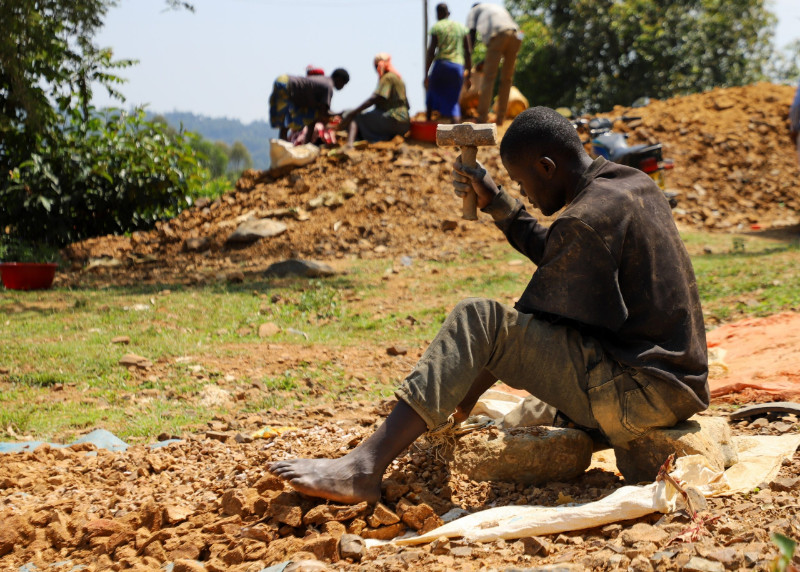Shanta Gold's proposed large-scale mining in Ramula, Siaya, has instilled fear among villagers facing potential displacement and loss of their land and livelihoods.
Long-standing family homes will be demolished, and the land beneath them will be taken away. Farmland will vanish, and graveyards will be emptied.
The deep cultural and spiritual significance associated with the land will be lost.
And that's not all.
Villagers are unsure if they will actually benefit from the large-scale mining once Shanta Gold's operations commence.
Despite the community's outcry, Shanta Gold and relevant authorities have shown little interest in addressing their concerns.
The lack of transparency and meaningful engagement has left the community vulnerable and voiceless.
On September 23, 2024, the Kenya Human Rights Commission (KHRC) and Haki Madini Kenya (HMK) petitioned the Siaya County Assembly, advocating for sustainable mining practices grounded in informed, transparent, and inclusive decision-making.
This petition followed a call from the county assembly for a memorandum regarding Shanta Gold's operations in Ramula. The contents of our petition are below.
Shanta Gold’s approach has raised significant concerns about its operations' sustainability and social responsibility. Experts argue that without proper community sensitization, transparent information sharing, and ongoing consultations, the project can cause long-lasting social and environmental damage. As the situation unfolds, the Ramula community remains uncertain about their future, caught between economic pressure and the desire to protect their land and heritage.
HMKand KHRC have closely monitored Shanta Gold's developments and activities within the Ramula community, other areas of Western Kenya, and across the border in Tanzania.
Understanding Shanta’s historical context, HMK and KHRC have engaged with the local community to address the concerns surrounding Shanta Gold's operations. In March 2024, both organizations conducted a scoping mission at the Voice of Salvation Church in Ramula Village to listen to and understand the community’s grievances.
Our scoping mission revealed that, despite the community's ongoing outcry, Shanta Gold and relevant duty bearers have shown little willingness to engage meaningfully to address the legitimate concerns of the host community and stakeholders. Rather than establishing a genuine grievance redress mechanism, Shanta has resorted to political manoeuvring, increasing divisions between supporters and opponents of the mining project. To date, local and national government leadership have provided ambiguous explanations regarding this significant project. Shanta Gold's lack of information disclosure and accountability has rendered affected individuals vulnerable to disruption and insecurity, alongside adverse social, environmental, and economic impacts.
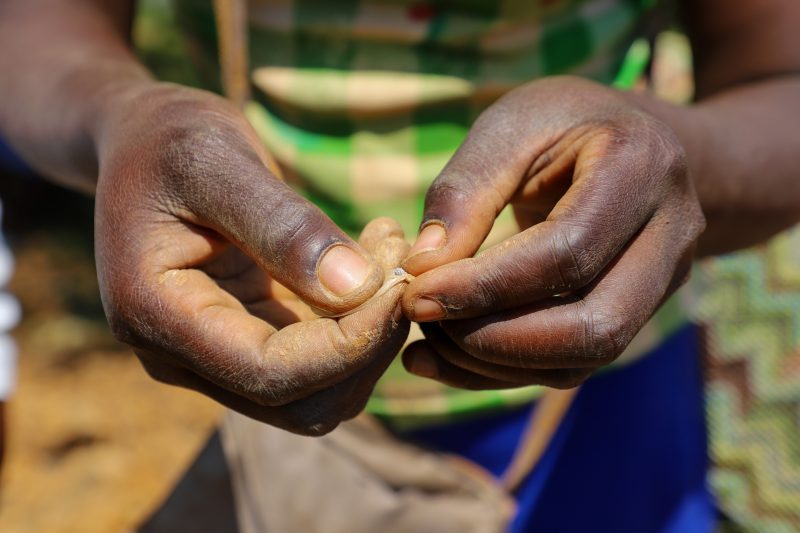
In the context of Business and Human Rights, companies like Shanta Gold must adhere to international standards, including the UN Guiding Principles on Business and Human Rights, which underscore the responsibility of businesses to respect human rights and engage in meaningful consultation with affected communities. Regionally, the African Charter on Human and Peoples' Rights obligates states to promote and protect human rights, including the right to participate in decision-making processes affecting communities. Locally, the Constitution of Kenya provides a robust framework for protecting land rights, community participation, and environmental conservation.
In this context, HMK and KHRC have thoroughly examined the petition submitted by the residents of Ramula to the County Assembly of Siaya on October 29, 2023, and strongly affirm the issues raised by the community. In solidarity with the petitioners, HMK identifies four critical issues that must be scrutinized from a responsible business perspective to pave the way for an inclusive and acceptable approach to Shanta's project in Ramula Community: -
- Land, Eviction, and Displacement
- Community Awareness and Engagement
- Environmental and Social Impact
- An Unclear Profile of Shanta and Doubts About the Mineral Rights it Possesses
Land, eviction, and displacement
Land in Kenya is a highly sensitive and emotive issue, deeply rooted in the country’s history and social dynamics. The Constitution of Kenya classifies land into public, private, and community categories, outlining principles of land policy aimed at safeguarding the rights of landowners, especially those under community land tenure systems.
Ramula, one of the three sub-locations of East Gem Ward in Gem sub-county, Siaya county, is notable for its high population density and complex land tenure issues. According to the 2019 population census, East Gem ward has a population of 18,992 and 4,585 households, with Ramula hosting the largest proportion (43 per cent, or 8,172 people). Covering an area of 16.0 square kilometres, Ramula has a population density of 512 persons per square kilometre, indicating significant land pressure and limited expansion space.
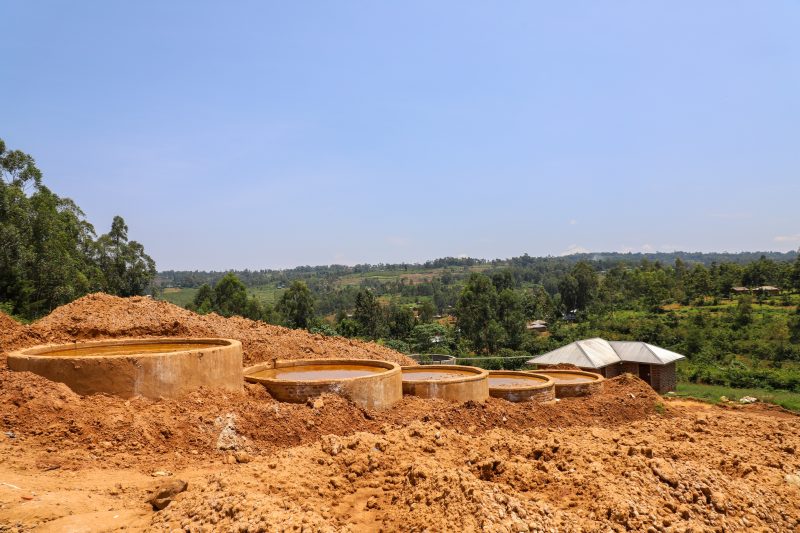
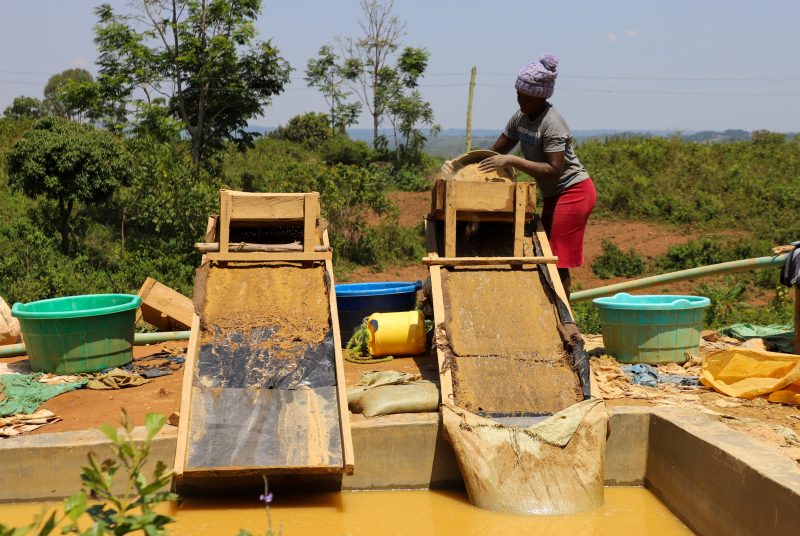
In Ramula, the land is predominantly managed through customary practices, meaning that many residents are occupiers in good faith or members of vulnerable cultural groups without formal land titles. The petitioners argue that, as community land, Ramula should be protected, but Shanta Gold’s activities have placed the community at risk. The company has created opportunities for land brokers driven solely by business motives, influencing and pressuring residents to sell their land without fully understanding the consequences.
Shanta Gold has directly negotiated with land occupiers, disregarding the inherent power imbalances and community interests. This has raised significant fears among residents, particularly those unwilling to surrender their land and heritage for mining purposes. The looming threat of displacement compounds the community’s apprehension, as many villagers rely heavily on this land for their livelihoods through small-scale farming and subsistence activities. The land is not merely a source of income; it carries profound cultural and spiritual significance through generations. The potential loss of this land threatens their economic stability, identity, and sense of belonging.
Moreover, the community has expressed deep concerns about losing valuable assets such as rivers, streams, forests, and spiritual sites, which hold immense cultural significance. These assets cannot be adequately compensated financially, compounding fears of losing their heritage and the resources essential to their way of life.
Section 38 of the Mining Act 2016 outlines the procedures for obtaining prospecting or mining rights on community land. It mandates that no mining rights shall be granted without the proper consent of the community, which must be documented through a written agreement. Section 39 of the Mining Act 2016 affirms that landowners or legal occupiers have the right to refuse consent. Contrary to these legal provisions, the Ramula community has been subjected to intense coercion, manipulation, and undue influence by Shanta Gold, pressuring them to consent to mining activities against their will. This coercion undermines the community’s legal rights and disregards the principles of fair and informed consent, jeopardizing their ancestral land, heritage, and way of life. Furthermore, Shanta Gold has faced similar accusations of human rights violations in the context of its operations. In 2016, landowners in Mlumbi village, Ikungi District in Singida, Tanzania, accused Shanta of conducting prospecting activities without consulting landowners and creating access routes through private farms without compensation.
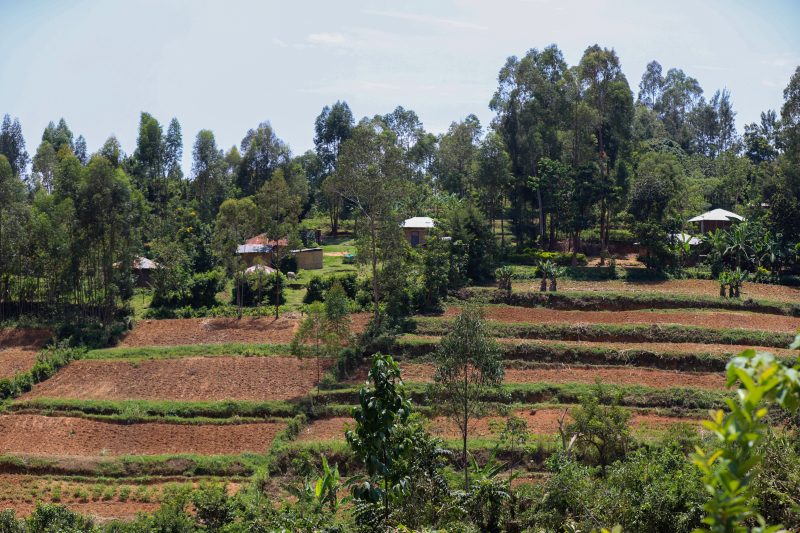
The Fourth Schedule, Part 2 of the Constitution of Kenya 2010, assigns roles related to mining to County Governments, including trade development, regulation, and land survey. Accordingly, the County Assembly of Siaya should conduct a comprehensive audit of the land situation where Shanta Gold has shown interest within the Ramula Community.
This audit should aim to identify directly and indirectly affected persons and facilitate a dialogue process that includes other critical stakeholders such as the National Land Commission (NLC) and relevant actors. This dialogue must ensure that the community's voices are heard, grievances are addressed, and proper procedures are followed in accordance with the law and community interests.
An inclusive and consultative process, exemplified by the Kitui County Government during the community engagement process for the Coal Mining Proposal, should guide the County Assembly of Siaya. The Kitui engagement ensured that community concerns, interests, and rights were adequately represented and protected. Similarly, the Siaya County Assembly must take proactive steps to safeguard the rights and interests of the Ramula community, ensuring that any mining activities are conducted with full transparency, proper consent, and respect for the community’s land.
Community awareness and engagement
Public participation and community engagement are fundamental principles underpinning sustainable development and good governance. Effective engagement ensures that communities have a voice in decisions affecting their lives, particularly in natural resource management contexts. Article 10 of the Kenya Constitution enshrines public participation as one of the national values and principles of good governance, emphasizing its critical role in fostering accountability and transparency.
The United Nations Declaration on the Rights of Indigenous Peoples (UNDRIP) emphasizes the right of indigenous peoples to participate in decision-making processes affecting their rights and territories, underscoring the necessity for free, prior, and informed consent. Similarly, the African Charter on Human and Peoples' Rights recognizes the importance of community involvement in matters concerning their land and resources.
In Kenya, the Constitution further solidifies these principles. Function 14, Part 2 of the Fourth Schedule empowers county governments to facilitate community participation in governance, ensuring local populations can effectively manage natural resources. This legal framework aligns with global best practices, prioritizing inclusive decision-making processes that reflect the voices and needs of the affected communities.
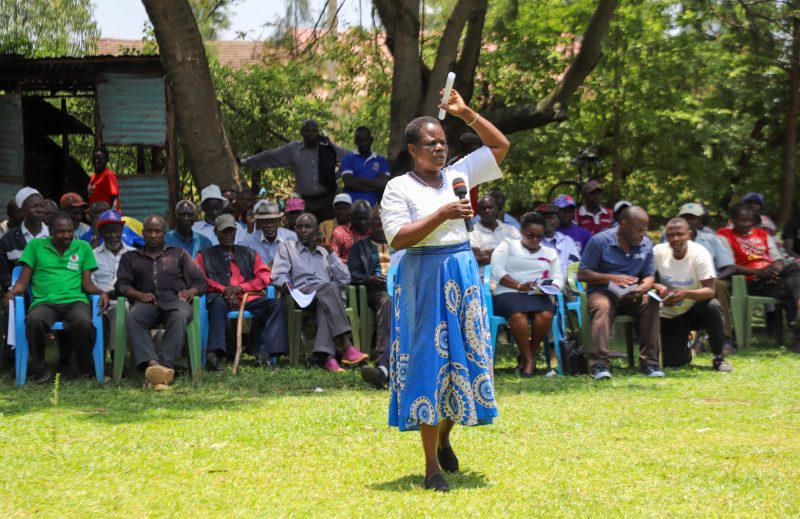
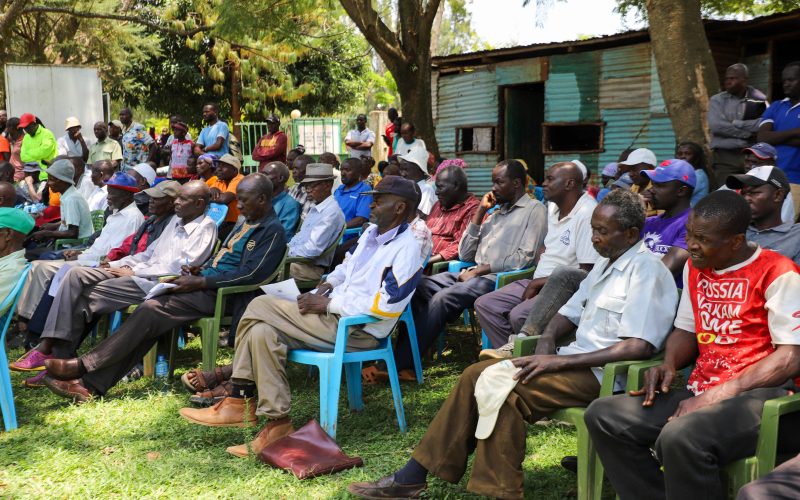
The Ramula community currently faces an overwhelming influx of mining activities from Shanta Gold without adequate awareness or functional community engagement mechanisms. Consultations reveal that most Ramula residents lack an understanding of large-scale mining, its implications, and its potential environmental impacts. This knowledge gap is a situation that Shanta Gold has been accused of exploiting to further its operations. Without reliable information, the community is vulnerable to misinformation, which can skew perceptions and hinder constructive dialogue. While some community meetings have been organized, these initiatives have stemmed from community efforts rather than from the County or National Governments or Shanta Gold itself.
For large-scale mining operations to be sustainable and socially responsible, they must be grounded in quality consensus achieved through extensive community sensitization, well-coordinated ongoing consultations, and transparent information sharing with affected stakeholders.
A crucial aspect of sustainable mining is obtaining a social license to operate (SLO), which goes beyond legal compliance and requires building trust and rapport with the community. This social license is contingent on the community's perception of the mining operation’s impacts on their social, cultural, and environmental landscape. In the case of Ramula, the lack of effective community engagement has resulted in significant distrust towards Shanta Gold, jeopardizing the company’s operations and the community's social cohesion.
To address these issues, the Siaya County Assembly, in consultation with the County Executive and the National Government responsible for mining, must urgently initiate a robust community organizing and sensitization program regarding the mining cycle. Valuable lessons can be drawn from the experiences of local advocacy groups in the region and from community initiatives surrounding mining activities in neighbouring countries, which have successfully implemented structured programs to inform communities about their rights, the impacts of mining, and avenues for engagement.
An unclear profile of Shanta Gold and doubts about the mineral rights it possesses
The background of Shanta Gold and its operations is a focal point of concern for the Ramula community. The community remains sceptical of Shanta Gold's operational transparency, especially given the company's historical context of grievances in other regions, such as Tanzania. There is uncertainty regarding the legitimacy of Shanta Gold's mineral rights and its capacity to manage mining operations responsibly.
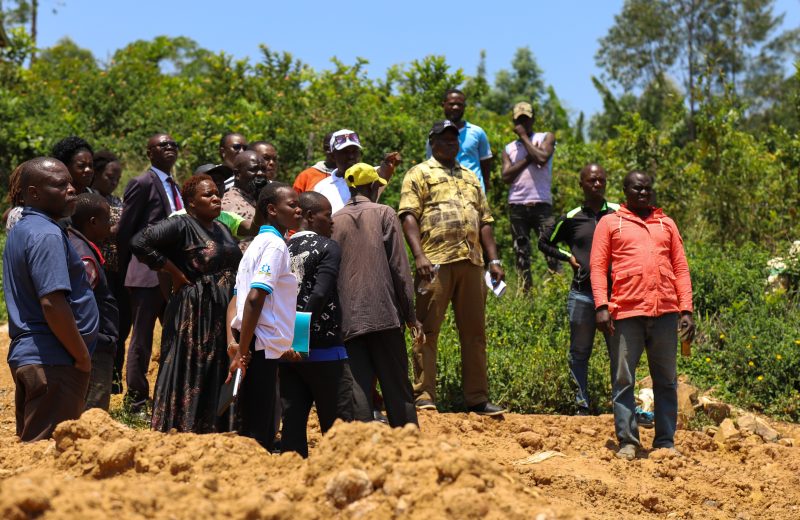
Transparency is crucial for building trust. Therefore, the Siaya County Assembly should advocate for Shanta Gold to disclose comprehensive information regarding its operations, including:
- Detailed information on Shanta’s corporate structure, ownership, and operational history.
- Clarity on the mineral rights acquired and the specific licenses held in Ramula and surrounding areas.
- Evidence of past successful mining operations, including adherence to environmental and social obligations in other jurisdictions.
Conclusion
In conclusion, HMK and KHRC emphasizes the importance of addressing the concerns raised by the Ramula community in a collaborative manner. The Siaya County Assembly must prioritize the community's right to engage meaningfully in decision-making processes, safeguard land rights, and ensure that any mining activity is conducted transparently, ethically, and with respect for human rights. It is essential to create a balanced approach that upholds the interests of both Shanta Gold and the Ramula community while safeguarding the rights and dignity of those directly affected.

